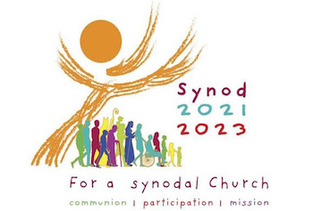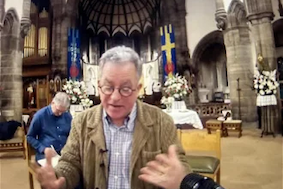London: Farm Street Parish Synodal Day

The Jesuit Church of the Immaculate Conception, Farm Street, London, as a parish, has been strongly committed to engaging in the Synodal Process initiated by Pope Francis in 2021. Some 25 people associated with groups based in the parish came together in January 2023 to more embody the spirit of Synodality instead of continuing as separate groups. Those involved in the parish's
Synodal Listening and Prayer Groups joined with LGBT+ Catholics Westminster, the London Jesuit Centre, members of the Homeless Lunches community, and Westminster Justice & Peace, for a day of reflection, discernment, and discussion around the theme of the Synodal Continental Stage:
Expanding the Tent. This submission draws on those reflections.
RESPONSES TO THE CONTINENTAL STAGE DOCUMENT'S 3 QUESTIONS
1. After having read and prayed with the Continental Stage Document (CSD), which intuitions resonate most strongly with the lived experiences and realities of the Church in your continent? Which experiences are new, or illuminating to you?
The Synodal Process aims to draw more people into the tent and while the Covid pandemic led to some loss in numbers, others have become more involved than in the past life of the Church. How do we avoid people feeling that they are being thrown out of the tent? When, how, and what led to the tent shrinking? Putting up a tent is not just a male activity. A common experience about the Synodal Process is that communication has been weak and transparency, mostly invisible.
While valuing the sense of community that this image brings, what Church structures, systems, and individual actions of the hierarchy, other clergy, and parishioners, have led to a feeling by many that they are outsiders? In spite of the amount of their grassroots work undertaken in the Church, many women feel this most strongly, as well as people who don't have close family contact or experience, including those who have chosen their family, when so much Church life is based and preached upon an idealistic family model. The Body of Christ and the People of God are the images and models that a Synodal Church requires to be enacted.
How do we experience, speak of, and share the love of God, the source of the Church's community life? The primary message needs to go out that, before all else, all churches are open to sharing the love of God with all people, meeting them where they are at. Too often, people feel that the Church and its pastors are gatekeepers, controlling access to God's love.
If we focus on God and our faith celebrated in meaningful liturgy, that could break down some of the barriers and exclusion. For many, including those who preside, the liturgy has become routine. If the liturgy is the source and summit of the Church's life then there needs to be a deepening of ways to bring this home. Its welcoming relationship with daily life and the wider community could be explored through smaller group settings such as house/neighbourhood groups.
The liturgy is not simply a didactic exercise, but a celebration, and this needs to be explained. If we get into good habits when times are good, then this sustains us when times are bad. While valuing our traditions, we should not be rigidly fixed to the past.
Our various Farm Street communities welcomed the emphasis on outreach to the margins of Church and society, and how this has been expressed in Diocesan and National Syntheses Reports with regard to the leadership and ministry of women, and the inclusion of LGBT+ Catholics. However, a real lack of respect for women's charisms continues - 'we are not just baby-makers'.
Overall, it has been a positive experience of engaging with and reflecting on the CSD, and there appears to have been good representation at Diocesan level in discussing it, although the lack of representation of younger people was noted. While the Summary Document was less 'heavy' it seriously underplays issues that have arisen through the continuing Synodal Process, particularly with regard to women. Questions must be asked about how much integrity has been part of the process at a higher level, especially when it comes to synthesising views about women, LGBTQ+, and underplaying lay-people's frustration about lack of action and communication. This has led to cynicism and disengagement with the process in some places.
2. After having read and prayed with the Continental Stage Document, what substantial tensions or divergences emerge as particularly important in your continent's perspective? Consequently, what are the questions or issues that should be addressed and considered in the next steps of the process?
There is an underlying cynicism that as long as a Vatican top-down approach is preserved, things will never change. Much of the experience of Church is what we don't want - what do we want? People want to be Catholic but they don't feel they can, so the Church needs to move with the times - see the signs of the times and realise that it needs to mee people where they are. As in responses to Question 1, we seem to be more comfortable talking about 'Church' than 'faith'.
There are tensions over Synodality itself - journeying in what direction? We have a sense that the hierarchy and many clergy are frightened by the Synodal Journey, reluctant to 'let go'. It has exposed a gap between where the hierarchy appears to be and that of dissenting lay voices on a range of issues. The whole Church needs to grow in Synodality; is this part of the journey? If so, we need to see the fine words of Synodal documents, local, national, continental, and Vatican, translated into action. We must be shown to be the people we say we are in enlarging the tent space.
Key in this is for the laity to have more decision-making power. We would like to see a diversity of lay people involved in the 2023 & 2024 Rome Synod meetings, not simply as observers, but with rights to speak and vote. The appointment process of Delegates to local, national, continental, and Vatican Synodal meetings needs to be far more transparent, including going to the margins, rather than a reliance on Church bureaucrats.
If Synodality is about changing the Church's culture the full acceptance of women's and LGBTQI+ Catholics gifts needs to be faced honestly. The growing voices of traditionalism and their power in some places, particularly in Eastern Europe, are not mentioned in the CSD. This has wider social and ecclesiological significance. How do we embrace, in a Synodal Church, those who are strongly opposed to such a vision and culture?
The ecumenical significance of being a Synodal Church is welcomed but there needs to be greater encouragement of common worship outside of the Eucharist. At the same time, welcoming those of other traditions, holding a common belief in the Eucharist, should be more actively explored.
There needs to be an examination of the ways in which the ordained ministry is carried out. There are tensions between the material pressures of responsibility for buildings, finance, etc and the properly ministerial functions of evangelisation, of empowering a local Christian community in prayer, worship, and outreach. A greater commitment to lay training and support should be promoted. In many parishes lay people are often better qualified, theologically, and skilled liturgically, than clergy.
With falling numbers and increased ageing of clergy, church closures or merging of parishes are not necessarily the answer, and certain not a sign of 'expanding the tent'. The pandemic showed that people are keen and closely involved in making parish life happen. Those who are not ordained should not be regarded as 'free labour', such as women religious in pastoral activity.
The Church must welcome people as individuals in the way that God made us, in all our diversity, with love, and without judgement. The Roman Catholic Church is characterised so often (within and beyond) by views on abortion, LGBTQI+, sex and gender, rather than belief in the Resurrection experience of God's love for us. We need to move beyond labels of 'LGBTQI+', women', 'the young' , 'the old', to a communal concept of sisters and brothers, as shown in the Acts of the Apostles.
People should be accepted as individuals in God's image, with everyone feeling welcomed 'in the tent'. This needs to be better communicated as a basic tenet that everyone should be treated equally in every respect. More enlightened biblical teaching is needed, as well as affirmations of the primacy of conscience and the development of Church teaching.
Arguments about how the Church should navigate controversial matters are often ways of avoiding talking about the issues themselves. When we identify an issue we want a rigorous and vigorous response, not just rhetoric. In all kinds of areas the principle should be 'nothing about us, without us', and not determining outcomes by picking methods that maintain the status quo. We need to trust the Spirit's guidance of the Church, however it approaches resolving these concerns.
3. Looking at what emerges from the previous two questions, what are the priorities, recurring themes and calls to action that can be shared with other local Churches around the world and discussed during the First Session of the Synodal Assembly in October 2023?
Some of the following responses relate more to Farm Street Parish or Westminster Diocese than the global Church. The challenge of the next stages in the Synodal Journey is how do we move from 'listening' to 'changing'. Sometimes it is necessary to adjust the tent-pegs, otherwise they could rot or rust in the ground. Forthcoming Synodal messages should highlight a freedom to think outside the box, or tent, to do something else within the global tent we call Church.
Increasingly anonymous, cyber-dominated, and fractured societies long for greater experiences of community. The models of Church as Body of Christ and Pilgrim People of God offer us visions of what a Synodal Church might look like, composed of shared spaces where people come together to pray, to learn, to worship, to act for justice, to reach out, and be reached by those on the margins of Church and society.
The Synodality vision should be promoted by a maximised use of the internet and social media. Meeting in person and internet communication are not mutually exclusive and we should engage parishioners with these skills to exercise them as a particular kind of ministry.
The Church must give a real witness to what it really is: a resurrection community with a baptismal identity, lived out in worship and action. It must learn from hearing from those beyond the Church, or the previously unheard voices of abuse-survivors.
If we have a priority for smaller communities, how can this work with sometimes larger, urban church congregations, without fragmenting a strong sense of identity? Is it helpful to give particular attention to specific groups such as young adults, language or minority ethnic groups, LGBTQ+, people with other abilities ? What resources can be offered to assist the diversity of our populations both to embed with parish and diocesan structures, but to retain their community identities?
Noting that Jesus died at 33, Churches should learn from each other what has been successful in developing leadership opportunities, many of which are inadequate, for young people. How is this leadership fostered/ Is leading worship music a helpful tool? Who are 'young adults'?, who are the elderly? What provision is there for over-50's; are they passive recipients, or grey panthers - active elderly?
We need discovery and deepening formation for all, and even, perhaps defined tenures for those in leadership roles, including those in ordained ministries. Serious consideration and action should be taken regarding the empowering and licensing of lay pastoral workers, alongside the now formally instituted ministries of Catechist and Reader.
We do not need to wait until 2024 to effect some of the practical actions which have already been proposed in various Synodal Syntheses and Vatican Synod Office documents. We need to consolidate Synodal practices so that they can be seen to have been incorporated in the lived reality of Catholic communities, rather than dropping off the agenda. By acting synodally, the Church at all levels will be seen to have opted for the core aspects of the Church's mission and thus fulfil the Synodal theme of Communion, Participation & Mission.
We encourage the global Church to embrace honesty, integrity, and transparency in hearing and speaking about subjects which are still taboo in certain ecclesial contexts, even when Pope Francis is encouraging such discussion, such as LGBT+ decriminalisation. LGBTQ+ Catholics must be recognised, along with everyone else, for the gifts they bring to the community instead of being seen as a doctrinal matter to be shelved, or a problem to be dealt with. Policies of exclusion are still in place in many parts of the Church and there appears to be no life-path for LGBTQ+ Catholics who are not called to ordained ministry or religious life.
When it comes to expectations around equality and inclusion we must clear about what this means: all Church positions open to everyone and not simply a partial acceptance, or invention of barriers. We need to see more women in Vatican positions, for example as Ambassadors of the Holy See, and other posts which do not require clergy. There should be zero-tolerance of the exclusion of LGBTQ+ Catholics in positions such as in Catholic schools, pastoral ministry, etc.
In reaching out to the 'marginalised' the Church must be proactive in its invitation to come inside the tent. It must allow itself to hear the Gospel from them and not assume that evangelisation is one way. It must work for justice for whomever they are, not just considered 'acceptable' groups. People flocked to Jesus because he cared, he loved, he took pity, he healed, and was present to their needs. We should not lose sight that the Creator's power of love flowed though him and. as his Body in the world, through our baptismal identity we are called to do likewise, rooting this in a quiet, loving presence in and for the world, 'that the world may believe'.
A priority of care is still noticeable at the parish level, often seen where churches come together to respond to disasters, local or international, providing warm spaces in the cost of energy crisis, campaigning for a real Living Wage, and decent housing, standing with refugees and asylum- seekers, supporting survivors of trafficking. Parishes and Diocese should identify in their pastoral planning these many constituents and how they might receive appropriate responses. For Jesuit parishes and ministries, how does the Synodal Journey relate to the Universal Apostolic Preferences of the Society of Jesus: Showing the way to God, Walking with the excluded, Journeying with youth, Caring for our Common Home?
In all of this there should be a renewed recognition of the importance of subsidiarity where matters can be more effectively dealt with at lower levels within the Church's structures. Ecumenical matters often work better at parish levels; gathering the sensus fidelium is more relevant at local levels than attempts to find a global consensus, not least from the those who have left active practice. The pastoral practices and theological visions of the local Church need to be affirmed, rather than silenced or criticised. Where good safeguarding and diversity policies exist in the Church, they should be shared with other local Churches who have yet to implement them.
Finally, there are fears that the Final Report of the Continental Stage, or the Working Document for October 2023 will display a chasm between what has emerged in local and national Listening Processes and the deliberations of the Prague European Assembly and the October 2023/2024 Synodal Sessions.
The Synodal theme - Communion, Participation, Mission - needs to move beyond mere slogans to spelling out what they mean in practice: Mission - Love God, love neighbour, for real; Participation - All the people of God, women, men, LGBTQ+ Catholics have the same responsibility for the Church's mission, moving from toleration to acceptance; Communion - really become a relational Church rather than a power-defined hierarchical structure.
"Do not hold back ... Do not be afraid ... You will not be put to shame ... Do not fear disgrace ... You will not be humiliated ...!" (Isaiah 54) - these are our message to the England & Wales Delegates when they speak in Prague.
Farm Street Jesuit Church, 21 January 2023


















